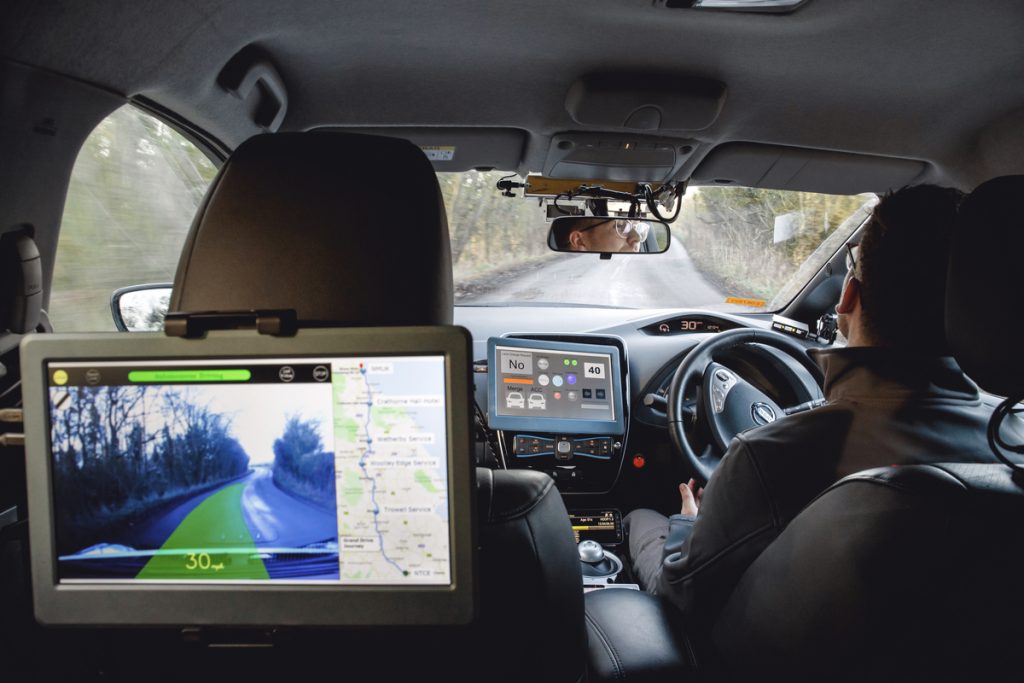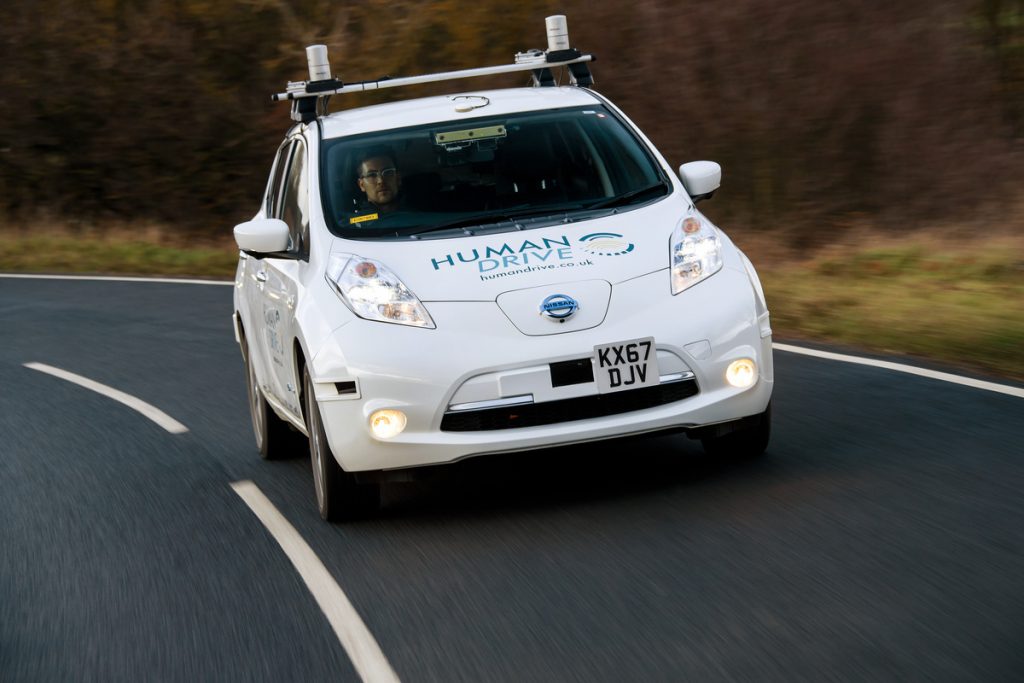A British-based research project into the latest autonomous vehicle technologies has successfully completed a 230-mile self-navigated journey on UK roads.
The project, HumanDrive, is jointly funded by UK government through the Centre for Connected and Autonomous Vehicles (CCAV) and Innovate UK, and nine other consortium partners. The joint funding package for the project totalled £13.5m.
The research project has successfully completed two trials, a 230-mile self-navigated journey on UK roads – ‘Grand Drive’ – using advanced positioning technology and also a test track based activity which explored human-like driving using machine learning to enhance the user experience.
The test vehicles included Nissan LEAFs, featuring GPS, radar, LIDAR and camera technologies that build up a perception of the world around it. Using that perceived world, the system can make decisions about how to navigate roads and obstacles it encounters on a journey.
Grand Drive in Detail
The first element of the project was the ‘Grand Drive’ from Cranfield, Bedfordshire, to Sunderland. The achievement was the culmination of 30 months’ work by the HumanDrive consortium – a team led by Nissan engineers in the UK, working in partnership with consortium members.
One of the key aspects of the project was to develop an advanced, autonomous vehicle control system. Ensuring that future advanced autonomous drive (AD) systems create a comfortable and familiar experience for customers is important as we move towards a more connected and autonomous future.
The 230-mile journey saw the lessons learned put into practice in a range of driving scenarios to negotiate country lanes with no or minimal road markings, junctions, roundabouts and motorways. The autonomous technology activated along the route to change lanes, merge and stop and start when necessary.
Bob Bateman, Project Manager for Nissan Technical Centre, Europe, said:
“The HumanDrive project allowed us to develop an autonomous vehicle that can tackle challenges encountered on UK roads that are unique to this part of the world, such as complex roundabouts and high-speed country lanes with no road markings, white lines or kerbs.”
The Grand Drive was achieved as the UK-based consortium members worked together to investigate how autonomous driving can emulate a natural, human-like driving style.
HumanDrive and Machine Learning
The second part of the HumanDrive project looked at how machine-learning Artificial Intelligence technologies could enhance the user experience and passenger comfort of connected and autonomous vehicles. Pilot vehicles tested successfully on private tracks, also incorporate artificial intelligence systems developed by fellow consortium member Hitachi Europe Ltd, which enable real-time machine-learning. By building a dataset of previously encountered traffic scenarios and solutions, it can use this ‘learned experience’ to handle similar scenarios in future and plot a safe route around an obstacle.
These technologies were subjected to a robust testing process and developed using a range of facilities, including simulation, hardware in the loop, private test tracks.
Business Minister Nadhim Zahawi said: “Safely completing the longest autonomous drive in Britain is an incredible achievement for Nissan and the HumanDrive consortium, and a huge step towards the rollout of driverless cars on UK streets.
“This project is a shining example of how the automotive industry, working with government, can drive forward technology to benefit people’s mobility – while helping to slash carbon emissions.”
Future of Transport Minister George Freeman said: “The UK is fast becoming a leader in intelligent and automated vehicle and traffic management technology, a huge global sector set to create thousands of jobs.
“Our Future of Mobility: Urban Strategy is supporting transport innovation for cleaner, greener and smarter transport, and Nissan’s successful HumanDrive project is an exciting example of how the next phase of the UK’s transport revolution could look.”
HumanDrive also went beyond the development of autonomous drive technology. The research also focused on advancing cyber security features in AD vehicles, developing testing and safety methodologies for UK AD testing and investigating the implications of AD vehicles on the wider transport system.
HumanDrive and Nissan
While remaining a UK-based research project for now, the lessons learned from HumanDrive will help inform future AD systems.
Today, the new Nissan JUKE, LEAF, Qashqai and X-Trail models are all available with ProPILOT, a Nissan Intelligent Mobility technology and enhances a driver’s control by assisting with steering, acceleration and braking. It works in a single lane on highways, and is optimised for low-speed congestion and high-speed cruising.
By liberating drivers from some of the more mundane elements of motoring, ProPILOT helps to reduce fatigue and stress, whilst improving safety and enhancing control and confidence.
David Moss, Senior Vice President for Research & Development in Europe at Nissan Europe, said: “Nissan’s Intelligent Mobility vision is to develop autonomous drive technologies for use in all of our cars in any area of the world. The door is now open to build on this successful UK research project, as we move towards a future which is more autonomous, more electric, and more connected.”





